US election 2016: Super Tuesday to test candidates
especiales

Eleven states cast votes for candidates from either the Republican or Democratic parties or both in a contest seen as make-or-break for the hopefuls.
Contests stretch from Vermont in the east to Texas and Georgia in the south.
Donald Trump leads the Republican field and Hillary Clinton is ahead in the Democratic race.
There have been earlier votes in four states.
The first Super Tuesday polls opened in Virginia at 06:00 local time (11:00 GMT).
- Follow the latest live updates here
- US expats in UK voting on Super Tuesday
- Jon Sopel: Headwinds could ruffle more than Trump's hair
- Trump rally police 'ejected' black students
Senator Ted Cruz cannot afford to lose to Mr Trump in Texas, Mr Cruz's home state, while a reverse for Mr Trump in Massachusetts, with its moderate voters, could break the property tycoon's nationwide momentum.
Mrs Clinton is hoping to build on her weekend victory in South Carolina, where she polled heavily among African-Americans, to restore her political fortunes after a bruising defeat in New Hampshire to Bernie Sanders, her self-styled democratic socialist rival.
On 8 November, America is due to elect a successor to Barack Obama, a Democratic president standing down after two terms in office which have seen the Republicans take control of both houses of Congress.
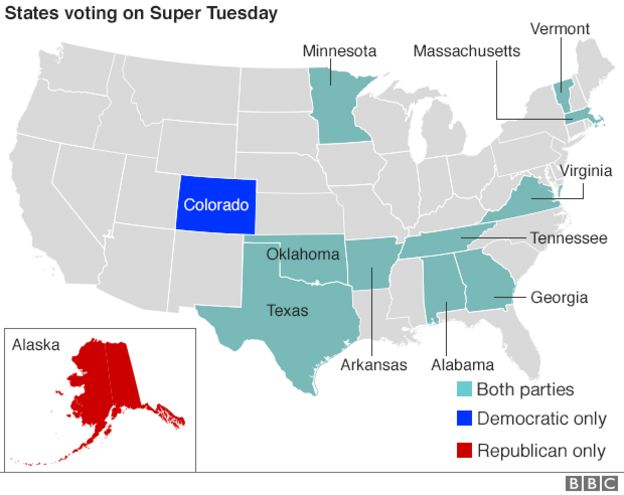
What's so super about Super Tuesday?
Why we should have seen Trump coming
Opinion polls give Mr Trump a lead in almost all of the 11 states holding Republican contests on Tuesday: Alabama, Arkansas, Georgia, Massachusetts, Oklahoma, Tennessee, Texas, Vermont, Virginia, Alaska and Minnesota.
The colourful campaign of the billionaire, who won three of the four early voting states, has divided Republicans.
On the eve of the polls, Nebraska Senator Ben Sasse became the highest-ranked elected party member to come out and say he would not back him for president.
He said he was "frustrated and saddened" and would look for a third option if Mr Trump won the Republican nomination.
Marco Rubio, the third-placed Republican contender after Mr Trump and Mr Cruz, is hoping to stay competitive, gambling on a win in his home state of Florida on 15 March.
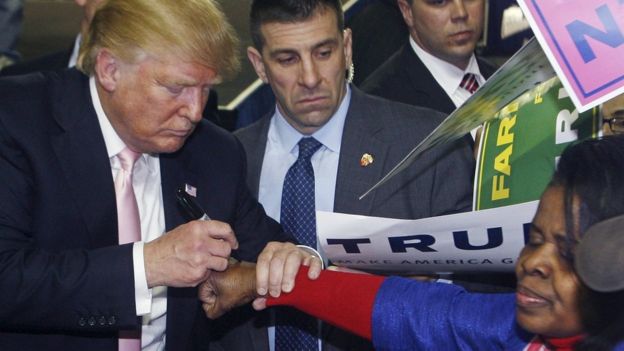 Donald Trump autographs the back of a supporter's hand in Valdosta, Georgia, on Monday / Reuters
Donald Trump autographs the back of a supporter's hand in Valdosta, Georgia, on Monday / Reuters
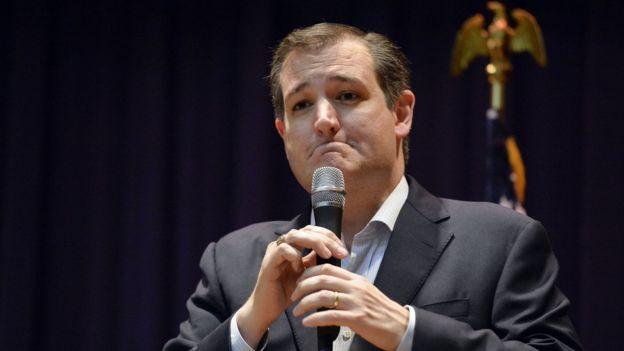 Ted Cruz speaks during a campaign appearance in San Antonio, Texas, on Monday / AP
Ted Cruz speaks during a campaign appearance in San Antonio, Texas, on Monday / AP
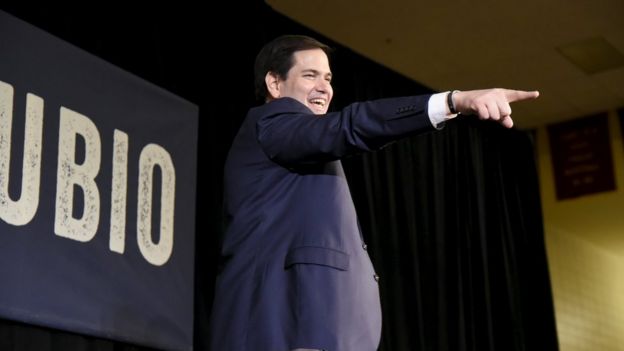 Marco Rubio speaks at a campaign rally in Oklahoma City, Oklahoma, on Monday / Reuters
Marco Rubio speaks at a campaign rally in Oklahoma City, Oklahoma, on Monday / Reuters
Mr Trump's commitment to several controversial immigration pledges, including the wholesale deportation of illegal immigrants and construction of a wall along the US-Mexico border, was called into question on Monday after reports describing an off-the-record conversation with the New York Times editorial board.
Mr Cruz, Mr Rubio and former Republican candidate Mitt Romney have called on Mr Trump to authorise the release of the transcript, in which Mr Trump reportedly says his hardline immigration policies would be flexible if he were elected.
Mr Trump also faced heavy criticism over his failure to disavow David Duke, a leader of the white supremacist Ku Klux Klan, who has endorsed the Republican candidate.
Protesters, including some from the Black Lives Matter movement, repeatedly disrupted a Trump rally in Radford, Virginia, on Monday after his refusal to condemn Mr Duke.
On Tuesday, Mr Trump said he had on several occasions in the past disavowed Mr Duke.
Mr Trump told ABC: "There's nobody who's done so much for equality as I have."
Democratic race
Democrats are voting in Alabama, Arkansas, Georgia, Massachusetts, Oklahoma, Tennessee, Texas, Vermont, Virginia and Minnesota, as well as in the US territory of American Samoa.
Democrats abroad will also submit their votes. There is also a caucus in Colorado, but the vote then goes to a state convention.
Mrs Clinton is eyeing black voters in places like Alabama, Georgia and Virginia after taking eight out of 10 black votes in South Carolina.
Bernie Sanders voted early in his home state of Vermont.
He told reporters that if turnout was high "we are going to do well. If not, we're probably going to be struggling".
But he pledged: "This is a campaign that is going to the Philadelphia convention in July."
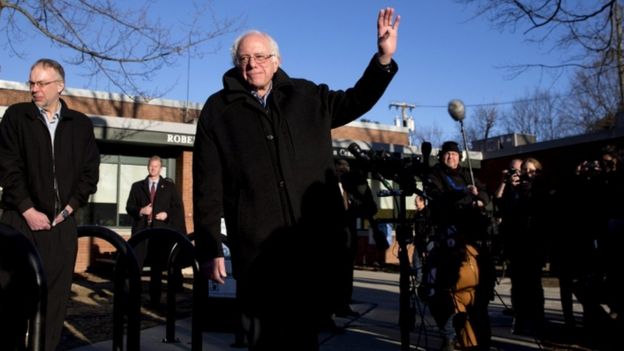
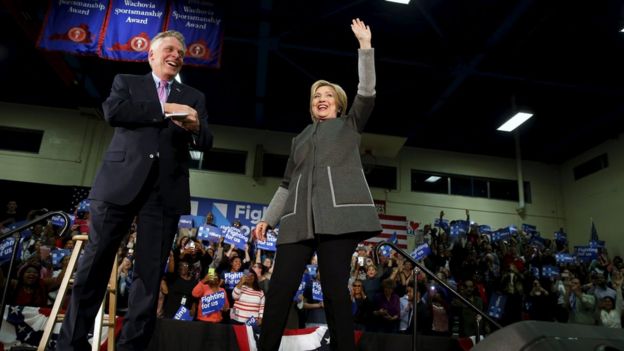













Add new comment